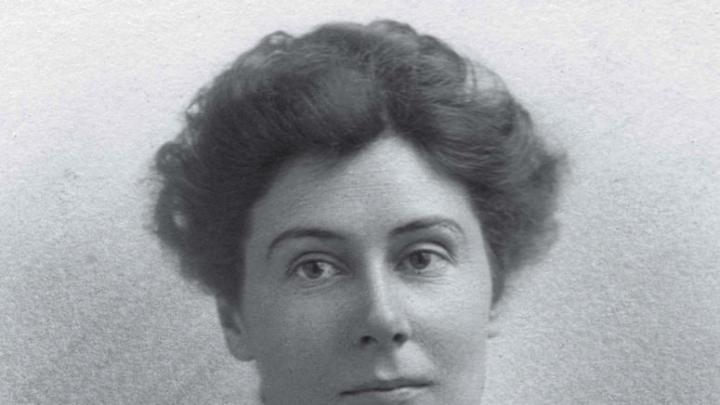In autumn 1916, as World War I advanced into a third deadly year, Ellen N. La Motte published a collection of stories, The Backwash of War: The Human Wreckage of the Battlefield as Witnessed by an American Hospital Nurse. “Well, there are many people to write you of the noble side, the heroic side, the exalted side of war,” she explained. “I must write you of what I have seen, the other side, the backwash.” Censored and long forgotten, her extraordinary book likely influenced Ernest Hemingway. But La Motte did not just bear bold witness to war. Courageously, she challenged societal norms as a trained nurse, public-health administrator, suffragist, socialist, self-proclaimed anarchist, lesbian, anti-opium activist, and more.
The Kentucky-born La Motte went to live with her wealthy relatives, the family of industrialist Alfred I. duPont, in Wilmington, Delaware, as a teenager. There she belonged to the “fashionable set” but aspired to something else. At 24, she applied, over her family’s strong objections, to Johns Hopkins School of Nursing. The Hopkins interviewer judged her “a most attractive woman—very handsome & ladylike,” and Wilmington’s Morning News soon announced, “One of our belles…has said good-bye to tulle and dancing slippers…and adopted the apron and cap of the hospital nurse.”
Following the three-year course and a few years gaining experience at home and in Europe, La Motte returned to Baltimore in 1905 to work as a tuberculosis field nurse. She also began writing prolifically about public health and tuberculosis, often challenging established wisdom. A groundbreaking appointment made her director of the tuberculosis division of the city’s health department in 1910, and she soon lowered the disease’s mortality rate.
Meanwhile, she proved herself an ardent social reformer and suffragist. She served as chief marshal of a major suffrage parade held during the Democratic convention of 1912, and a year later she left her job to join the militant British suffragettes led by Emmeline Pankhurst. The Baltimore Sun reported, “Miss La Motte [says] that while once she was a Socialist she has now stepped over the line and has become an anarchist.” Two months later, she wrote that she had already “been through four fights and one riot (and not always in the capacity of an innocent bystander).”
That autumn, she moved to Paris, where she drafted her first book, The Tuberculosis Nurse, and formed a close friendship with a fellow American, the modernist writer Gertrude Stein. After war broke out in August 1914, La Motte was among the first American nurses to volunteer. Gertrude Stein recorded that her friend was “gun shy but she did want to nurse at the front.” Eventually La Motte landed at a French field hospital jarringly close to the Western Front.
She completed The Backwash of War in early summer 1916. Its first story sets the tone. “When he could stand it no longer,” it begins, “he fired a revolver up through the roof of his mouth, but he made a mess of it.” The nameless soldier is transported, “cursing and screaming,” to a field hospital where his life is saved so he can be court-martialed and executed by firing squad. The book, published that September, was immediately banned in England and France but earned high praise and multiple printings in the still-neutral United States. The radical magazine The Masses called it “immortal.” “It tells unsparingly all that there is to tell—all that has never been told before.” And despite America’s entry into the war in April 1917, it remained on sale until August 1918, when it was suddenly censored and then quickly slipped into literary oblivion.
La Motte, meanwhile, had moved on. In summer 1916, she had left Europe to tour Asia with Emily Crane Chadbourne, a divorced American heiress and art collector who had been living in Paris. They had become a couple during the first winter of the war and remained together until La Motte’s death, their relationship occupying a liminal social space: recognized by some, considered a close friendship by others. (The acerbic English novelist Evelyn Waugh, who met them in Ethiopia in 1930, called them “two formidable ladies” whom “long companionship had made…almost indistinguishable.”)
The Asian trip revealed a new cause. La Motte realized that England and other colonial powers were forcing the cultivation, manufacture, and sale of opium in their colonies, while severely restricting its use at home. Between 1919 and 1934, she would write six books and dozens of articles about the evils of colonialism and the opium trade, spearhead an international anti-opium campaign, and play a key role in League of Nations conferences on the trade, even as she acknowledged, “The drug traffic dies hard. Vast financial interests, both of nations and of individuals, are at stake.”
Then in 1936 she told Gertrude Stein, “I have not been writing…I don’t seem to want to. Who wants to hear about opium in these troubled times? The Stock Exchange takes up my time…and brings me quite a nice return. I am having lots of fun with it.” A year later, after Chadbourne’s longtime financial adviser was caught embezzling, La Motte also began managing her financial affairs, earning more than $1 million in the market in the 1940s and 1950s. And in 1959, at 85, La Motte played a key role, facing much resistance, in revitalizing the venerable Crane Company, founded by Chadbourne’s father in 1855.
Few women of her era could boast such an astounding career.








